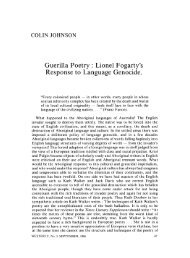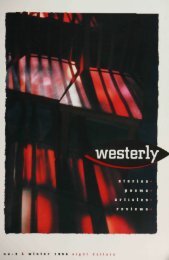You also want an ePaper? Increase the reach of your titles
YUMPU automatically turns print PDFs into web optimized ePapers that Google loves.
Felicity HaynesTHE WORLD'S GREAT TOTALOF DELIGHTCollected Poems 1936 -1967- Douglas Stewart,Angus and Robertson, Sydney, 1966, $6.25.Douglas Alexander Stewart, born in 1913 inNew Zealand and domiciled in Australia since1939, has, from nine books of verse and somerecent poems, pubHshed after five years ofsilence, a sizeable volume of his collected verse.There is little doubt that he is an "unfashionable"poet. His interest lies in the larger formsof epic, and in this cynical age his trust inheroic action is considered by many to benaive. It could simply be that his poetry isnot as susceptible to poetic criticism as thatof some other poets, and that he has thereforebeen disregarded by important literary critics.R. D. FitzGerald has called Stewart a masterof technique who "understands rhyme todaybetter than anyone else living", but this is notapparent at first reading. His techniques andawareness do not seem to have changed radicallysince his earlier poems, and while a closeinspection reveals a subtle skill that prefersclarity of meaning to startling technical innovation,lovers of modern poetry may be offendedthat he chooses to ignore the innovations ofPound and Eliot. In fact, while it is not intendedas a criticism on my part, one of thereasons for his not being currently recognisedmay be that he seems to be writing "outsidehis time".A more serious charge, in my opinion, isthat Stewart's background as a journalist seemsoften to lead him to verbosity, to a facile style.Whole poems are made to bear the weight ofone image, such as grasshoppers resemblinghopping red stones, and often they collapseunder the strain. The fault is seen in "Waterlily",a delightful fancy perhaps, but a trivialone:Look, look, there is an angel in the fishpond.It wakes its yellow wings above the water;Or say the naked moon came down to bathehereAnd dipped her toe in weeds and so wecaught her;Or say the sun fell in and sprang up yellow.Or say that mud's in flower today—nomatter:All images and fancies coalesce and cancelIn mystery at last; it is an angel.And moves its yellow wings above thewater.Often the poem is interesting at a superficiallevel only, like the occasional poem "With aWringer for Rosemary Dobson", and lacks thedepth and lasting interest that poetry demands.In the same way, although the central point iswitty enough, I find "Four-Letter Words", sixpages about lifting the censorship of certainwords in Lady Chatterley's Lover, both prolbcand too discursive.On the more positive side, this book showsa robust, vigorous faith in man, a vitalismthat Vincent Buckley sees as an inheritancefrom Norman Lindsay. While occasionally thisleads to loose poems, substituting sensationand romantic fancy for intellect and moralimagination, it is this quality that gives mostof his nature poetry its vivid life and presentsthroughout the book a positive ideaUsm summedup not very poetically in these lines from"Easter Island":Oh sparkUng runs the river of life and joyFrom that high source whose ecstasy iscreation.And dark is the fate of men who dare destroyWith doubt, with despair, with hate, itsradiant peace.Even to the massacre of a nation.WESTERLY, No. 1, MARCH, 1 968 53







